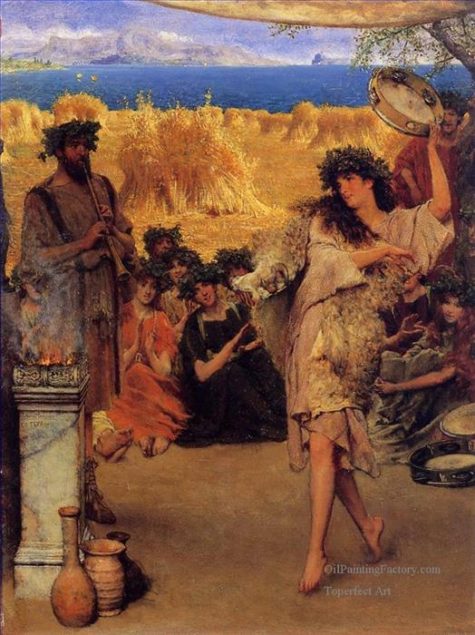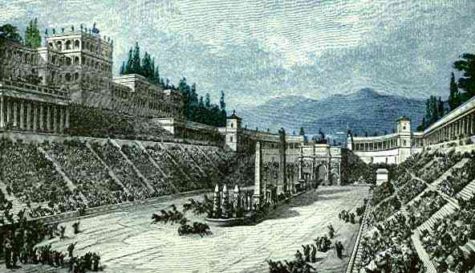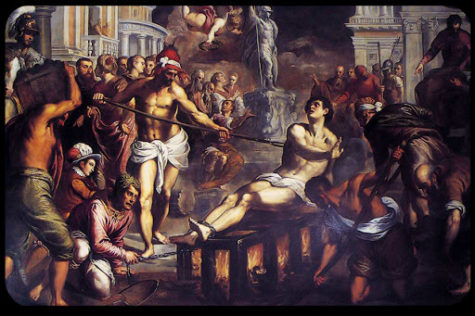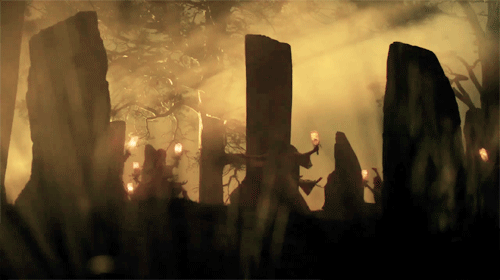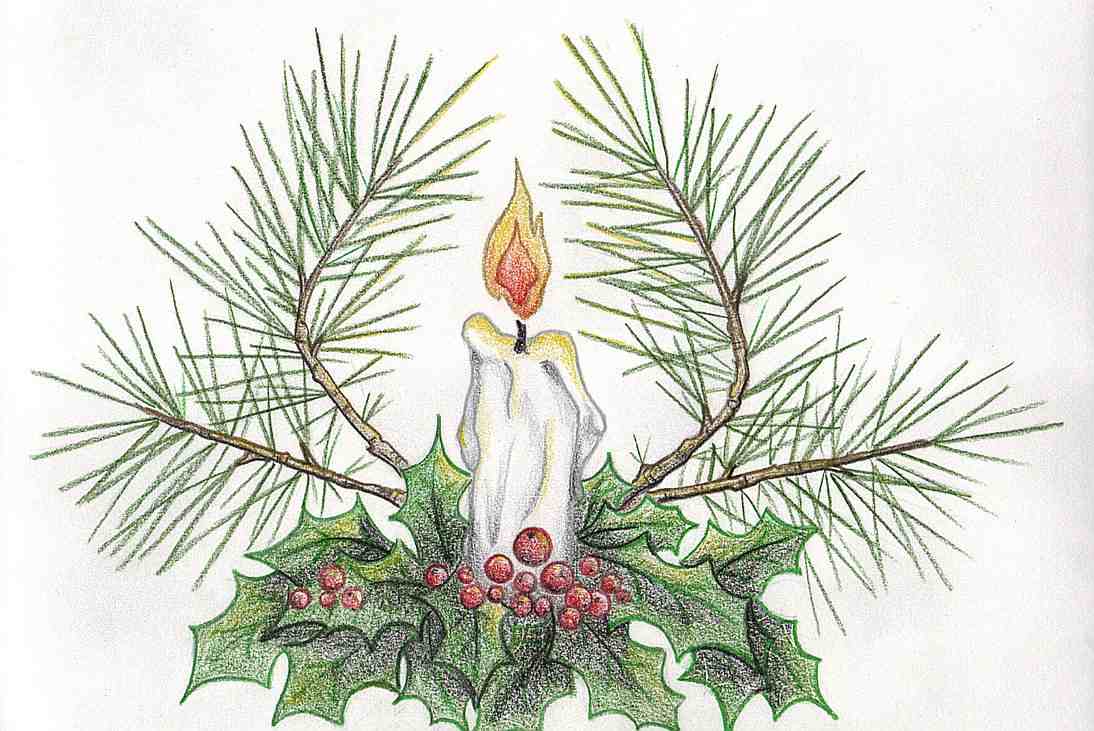Monthly Archives: August 2016
August 25th is the Opconsivia, (or Opeconsiva or Opalia) the harvest festival of Ops, the Roman goddess of agricultural resources and wealth, also known as Opis. The festival marked the end of harvest, with a mirror festival on December 19 concerned with the storage of the grain.
- Themes: Opportunity; Wealth; Fertility; Growth
- Symbols: Bread; Seeds; Soil
About Ops: This Italian goddess of fertile earth provides us with numerous “op-portunities” to make every day more productive. In stories, Ops motivates fruit bearing, not just in plants but also in our spirits. She also controls the wealth of the gods, making her a goddess of opulence! Works of art depict Ops with a loaf of bread in one hand, and the other outstretched, offering aid.
To Do Today:
On this day, Ops was evoked by sitting on the earth itself, where she lives in body and spirit. So, weather permitting, take yourself on a picnic lunch today. Sit with Ops and enjoy any sesame or poppy breadstuff (bagel, roll, etc.) – both types of seeds are magically aligned with Ops’s money-bringing power. If possible, keep a few of the seeds from the bread in your pocket or shoe so that after lunch, Ops’s opportunities for financial improvements or personal growth can be with you no matter where you go. And don’t forget to leave a few crumbs for the birds so they can take your magical wishes to the four corners of creation.
If the weather doesn’t cooperate, invoke Ops by getting as close to the earth as you can (sit on your floor, go into the cellar). Alternatively, eat earthy foods like potatoes, root crops, or any fruit that comes from Ops’s abundant storehouse.
More About This Festival:
The Latin word consivia (or consiva) derives from conserere (“to sow”). Opis was deemed an underworld goddess who made the vegetation grow. Since her abode was inside the earth, Ops was invoked by her worshipers while sitting, with their hands touching the ground.
Although Ops is a consort of Saturn, she was also closely associated with Consus, the protector of grains and subterranean storage bins (silos). The festival of Consus, the Consualia, was celebrated twice a year, each time preceding that of Ops: once on August 21, after the harvest, and once on December 15, after the sowing of crops was finished.
The Opiconsivia festival was superintended by the Vestals and the Flamines of Quirinus, an early Sabine god said to be the deified Romulus. The main priestess at the regia wore a white veil, characteristic of the vestal virgins. A chariot race was performed in the Circus Maximus. Horses and mules, their heads crowned with chaplets made of flowers, also took part in the celebration.
Sources: Wikipedia and 365 Goddess
On August 21, the ancient Romans celebrated the Consualia, a festival, with games, in honour of Consus, the god of secret deliberations.
It was solemnized every year in the circus, by the symbolical ceremony of uncovering an altar dedicated to the god, which was buried in the earth. This was because Romulus, who was considered the founder of the festival, was said to have discovered an altar in the earth on that spot.
The solemnity took place on the 21st of Augusta with horse and chariot races, and libations were poured into the flames which consumed the sacrifices. During these festive games, horses and mules were not allowed to do any work, and were adorned with garlands of flowers.
This festival is associated with the “Rape of the Sabine Women.” When after the building of Rome the Romans had no women, it is said, and when their suit to obtain them from the neighboring tribes was rejected, Romulus spread a report, that he had found the altar of an unknown god buried under the earth. The god was called Consus, and Romulus vowed sacrifices and a festival to him, if he succeeded in the plan he devised to obtain wives for his Romans. According to legend, it was at the first celebration of the Consualian Games that the Sabine maidens were carried off. The purpose being to populate the newly built town of Rome.
Note: Consus was eventually identified with Neptunus Equester, the alias and counterpart of Poseidon Hippios (Neptune), who was the founder of Atlantis, where, according to Plato, horses (hippos, equus) originated. Hence the connection with the animal.
When told by Roman officials to surrender the church’s valuables, St. Lawrence brought the city’s poor and sick. “Here is the church’s treasure,” he said.
Rome didn’t find this amusing, and legend says he was put to death in A.D. 258 by being roasted on a grate, although some scholars say he was more likely beheaded. In either case, folks in southern Europe still mark this day.
- It is customary there to eat only cold meat in recognition of the reputed manner of his death.
- Fair weather on St. Lawrence’s Day presages a fair autumn.
To do on Saint Lawrence’s Day:
Tonight, or especially tomorrow night and up to the dawn of August 12, if you look up at a clear sky in the Northern hemisphere, you may be blessed to see the Perseids meteor shower. This meteor shower is known as “the tears of St. Lawrence” because it is most visible at this time of year, though these streaks of light can sometimes be seen as early as 17 July and as late as 24 August.
To see St. Lawrence’s “fiery tears,” go outside after midnight, to a place as far away as possible from city lights (leave the city, if possible, and drive toward the constellation so that the city lights’ glow will be behind you). Lie down on the grass and look up and toward the North, about halfway between the constellation Perseus 3 — which will be very, very low on the horizon to the northeast — and the point directly overhead. Scan the sky elsewhere, too, but this area will be the most likely place to see the meteors.
If the sky is too cloudy or the Moon is too full for you to get a good view of the stars, you might not have any luck at all — but there will always be next year to try again!
When you see a “shooting star,” make a wish, as folklore says that wishes made when seeing such a star come true. Better yet, make the “wish” a prayer, and invoke St. Lawrence to pray it with you!
The darkness is no darkness with me,
but the night is as clear as the dawning,
that shineth more and more unto the perfect day.
~Saint Lawrence
As to foods, aside from the European custom of eating only cold meat, there is nothing else in particular associated with this day that I am aware of. However, given St. Lawrence’s mode of death, a barbecue might make for an interesting choice. Grill some meats and vegetables, have a nice cooler of beer, and prepare for a late night of star-gazing and recalling the glory of St. Lawrence! Continue reading
